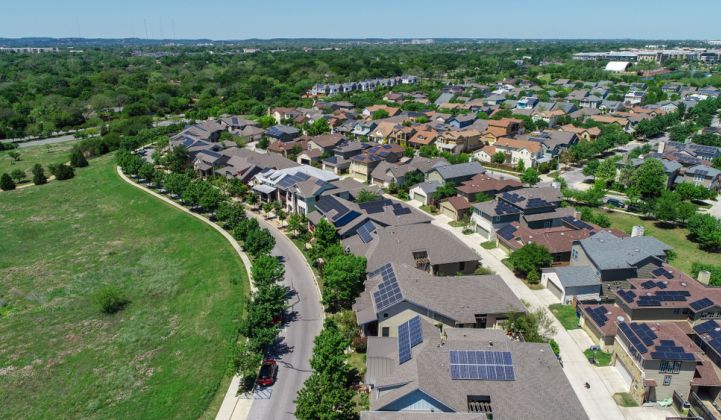Sunnova, a leading U.S. residential solar and energy storage company, has filed paperwork to go public on the New York Stock Exchange, in what could be one of the biggest U.S. renewable-energy initial public offerings of recent years.
Houston-based Sunnova last week quietly submitted a pre-IPO prospectus with U.S. securities regulators, giving investors a look at the privately owned company’s financial health, even as many details of the IPO remain under wraps.
Sunnova would trade under the ticker symbol “NOVA,” joining larger rivals Sunrun and Vivint Solar in selling shares to the public. SolarCity, once the country’s largest residential solar installer and a publicly listed company, was acquired by Tesla.
In 2018, Sunnova reported:
- Revenue of $104.4 million, up 36 percent year on year.
- A net loss of $68.4 million, 25 percent smaller than the year prior.
- An adjusted EBITDA of $41.1 million, a near-doubling of the prior-year figure.
Sunnova’s filing paints a picture of a company that is growing quickly but with challenges ahead. It raises interesting questions about the future of the residential solar market and what business model will most appeal to investors.
Like Sunrun and Vivint Solar, Sunnova focuses on solar leases and power-purchase agreements with homeowners, known as the third-party ownership (TPO) model. Sunnova typically remains the long-term owner of its PV installations rather than selling systems outright, though it also does some loan deals.
Compared to its closest TPO rivals, Sunnova is unique in relying entirely on smaller solar companies to sell and install its systems, through its network of “dealers.” Sunrun and Vivint Solar both have large in-house installation teams.
Sunnova is “the least vertically integrated” of the major TPO companies, noted Austin Perea, senior solar analyst at Wood Mackenzie Power & Renewables.
The upshot is that Sunnova has a relatively light physical footprint.
The company has an installed base of solar systems totaling 455 megawatts across 63,000 customer accounts. That amounts to a little less than half of Vivint Solar’s 1,107 megawatts of cumulative deployments.
Yet with just 300 employees as of March 2019, Sunnova’s workforce is less than one-eighth the size of Vivint’s 2,500-strong payroll. Sunnova has just three offices: its corporate headquarters in Houston, plus satellites in New York and Puerto Rico.
What looks like an advantage in one light could also double as a vulnerability, however
Although Sunnova claims more than 75 independent dealers in its network, a remarkable 52 percent of its deals came from a single partner last year: New Jersey’s Trinity Solar. Sunnova recently entered a four-year exclusivity deal with Trinity for most types of sales.
Meanwhile, the nature of Sunnova's model gives it less control over quality, Perea said.
"Partnering with smaller installers allows Sunnova to maintain lower cost of customer acquisition — local installers that lean more heavily on referrals tend to have much lower customer acquisition costs than national players."
"But without any in-house installation capabilities, Sunnova has less visibility into the business and sales practices of its channel partners than national installers," Perea said. "In an industry that increasingly relies heavily on customer experience, this is a long-term risk a company like Sunnova faces."
Sunnova’s fleet of installed systems is heavily concentrated in New Jersey, California and Puerto Rico. Its post-IPO strategy would focus on growing in “underpenetrated markets” and expanding its geographic footprint, including internationally, the company says.
The decline of TPO
The timing of Sunnova’s move toward the public markets is interesting given the relative decline of the TPO segment of the residential market, which was overtaken last year by solar loans, WoodMac data shows.
Put simply, more American homeowners are choosing to own their solar systems outright, rather than signing leases or PPAs like those Sunnova offers.
However, the TPO model could get a boost over the longer term as the solar Investment Tax Credit phases out, analysts say. PV systems owned by homeowners will not receive any ITC incentive after the phaseout, while those owned by companies like Sunnova are set to receive a 10 percent ITC indefinitely.
According to WoodMac, Sunnova was the fourth-largest player in the TPO market last year, trailing Sunrun, Vivint and SunPower, and it was the seventh largest in the overall residential solar market.
The U.S. installed 10.6 gigawatts of new solar capacity last year, with the residential market growing 7 percent to 2.4 gigawatts.
Like many of its peers, Sunnova is putting a heavier emphasis on its energy storage offering, known as SunSafe. It’s also focusing on selling long-term service plans to homeowners who bought solar systems from other providers.
Sunnova did not respond Tuesday to a request for information about its IPO plans, which were first reported last month by Reuters.
Among the underwriters included in the IPO prospectus are BoA Merrill Lynch, J.P. Morgan and Goldman Sachs.




